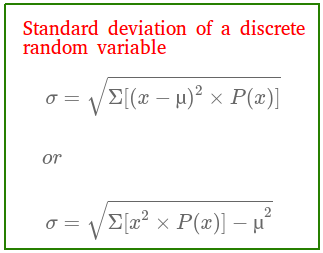Standard deviation of a discrete random variable
The standard deviation of a discrete random variable is denoted by σ and the formula to use to compute the standard deviation is the one you see below.

We can use the example in the previous lesson about the number of people going to the movie theater each week to look for the standard deviation. We will show you how to use both formulas above.
Calculating the standard deviation of a discrete random variable
In the lesson about mean of a discrete random variable we have the probability distribution table shown below.
| |
We have already looked for the mean in the lesson about mean of a discrete random variable and we found that E(x) = 0.86.
Here is a table showing how to compute the standard deviation using this formula.
| x | x - μ | (x - μ)2 | P(x) | (x - μ)2× P(x) |
| 0 | -0.86 | 0.7396 | 0.5 | 0.3698 |
| 1 | 0.14 | 0.0196 | 0.25 | 0.0049 |
| 2 | 1.14 | 1.2996 | 0.15 | 0.19494 |
| 3 | 2.14 | 4.5796 | 0.09 | 0.412164 |
| 4 | 3.14 | 9.8596 | 0.01 | 0.098596 |
| ∑[(x - μ)2× P(x)] = 1.0804 |
1.0804 was of course found by adding all the numbers in the last column. This number is called variance, more specifically variance of a discrete random variable.
Variance of a discrete random variable = ∑[(x - μ)2× P(x)] = 1.0804
The standard deviation is the square root of the variance or σ = √(1.0804) = 1.039422
Here is a table showing how to compute the standard deviation using the other formula.
| x | x2 | P(x) | x2 × P(x) |
| 0 | 0 | 0.5 | 0 |
| 1 | 1 | 0.25 | 0.25 |
| 2 | 4 | 0.15 | 0.6 |
| 3 | 9 | 0.09 | 0.81 |
| 4 | 16 | 0.01 | 0.16 |
| ∑[(x2 × P(x)] = 1.82 |
1.82 is found by adding all the numbers in the fourth column.
μ = 0.86, so μ2 = 0.7396
∑[(x2 × P(x)] - μ2 = 1.82 - 0.7396 = 1.0804
Again, this number is the variance of the discrete random variable. Just get the square root of this number to get the standard deviation. Since the number is the same as the one before, the answer is the same!